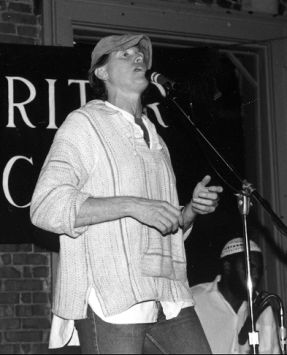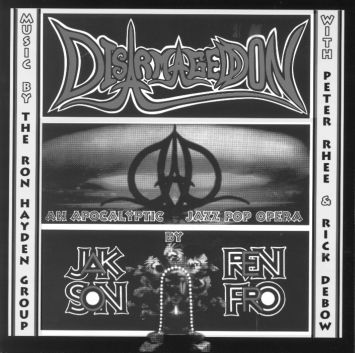social bookmarking tools:
 |
|
| Available RSS Feeds |
|---|
 - Top Picks - Top Picks |
 - Today's Music - Today's Music |
 - Editor's Blog - Editor's Blog
|
 - Articles - Articles
|
Add Louisville Music News' RSS Feed to Your Yahoo!
|
Front and Center
Jak Son Renfro
By Victoria Moon
"It's a good day for war to die!"
So says the Prophet of One in Jak Son Renfro's newest released, a self-described "apocalyptic jazz pop opera." The Prophet in Renfro's opera is the protector of Peace, the one who helps in the final destruction of the god War. It does not take long to discover that there are many similarities between Refro's character and Renfro himself.
Over coffee at the Twice Told Coffeehouse one Wednesday night, Renfro sat down to discuss his new release, DisArmageddon. During that conversation, he moved from Joseph Campbell's work on mythology, through Shamanism, pacifism, art, to God, the universe and everything, plus a brief history of war. Though I began the interview in a linear way, asking Renfro how long he's been playing in the Louisville area (since 1988) and if he's originally from the area (he is), and basic questions about his former band Serpent Wisdom, the interview quickly took a more elliptical shape as he began to discuss the process of making DisArmageddon.
More of an odyssey than anything else, DisArmageddon started nine years ago with the discovery of the word "DisArmageddon." Renfro described that event this way:
"The first word came to me - those two words coming together, 'disarm' and 'Armageddon' - on Martin Luther King Monday, 1988. I remember the moment . . . we had played music at the open stage at Rudyard Kipling . . . and had gone to a friend's house afterwards. [Later] I was driving home, because at that point I lived in Skylight, Kentucky and had a long drive home, and I was headed down Southern Parkway and I don't know why or what, but the events of that night led to the melding of those two words. And then it hit me - I probably said it out loud - "disarmageddon."
"It was like a light went off in my head. I pulled over to the side of the road - it was enough that I didn't want to drive while this was going on - and I was thinking, 'my god, my god - I'm going back and telling everybody!' And then I thought 'Wait - what would I tell them?' "

The word disarmageddon, Renfro went on to explain, was a boon.
"Boon is a pretty archaic word at this point. It's when the adventurer crosses into the Netherworld; the boon is the prize, it is what is received: the elixir, the fleece, the golden treasure - that's a boon. That's what's brought back to the nation . . . for the healing process, the recovery."
And Renfro, like the adventurer of old and the Prophet of One, began to prepare to bring his boon, disarmageddon, to a world desperately in need of a little peace.
"I'm a Shaman," Renfro admits, "I finally recognized that. I had a difficult time admitting that and even was embarrassed by it; afraid I'd be rejected - and I did get that, too - but it's just the truth. I take a trip, I go within myself . . . in this particular instance I had to go deeper within, much further and much deeper than I'd ever gone before."
Renfro's trip to within himself started in earnest one night when a stranger's fist against his face was the catalyst for him to begin to understand more clearly the significance of disarmageddon and the story or prophecy that the word told.
"The guy whose fist I needed to get that far - in some ways I set that up," he said. "I did some things that were not like me at all: I put my finger in a man's chest and I was holding forth on the street, and he's already told me to get my finger out of his chest. It was like I was inviting it - very strange night, very strange.

"Father's Day, a new moon. Immediately there was this notion that I was somewhere where I had to be. Within seconds of him [hitting] me, I was thinking 'Very strange - I don't know what this is, but I'm supposed to be here.' There was no resentment, no hatred, no anything toward the guy. He was incidental - that's the way it felt."
After Renfro's encounter with the incidental messenger on the street, he spent approximately eight weeks with his jaw wired shut and it was during that time that the songs that make up DisArmageddon were discovered and as Renfro puts it, "translated."
"I got what I had to get, and I brought it back," he explained. "It took me the full eight weeks just to get the translation correct, but the songs would never have been; they would have never been the songs they were born to be had I not gone through this. So that awful experience was precious, and I would never have traded it for anything."
Or, as Renfro illustrates it in his press release for DisArmageddon, meeting the man in the street was the Nothing out of which came a great Something - the concepts and songs for this project.
"DisArmageddon gave a name to what has to happen before peace can be achieved," Renfro explains. "Somebody could come up with a better name [for the process] - actually, I'd like to see that, I don't know if there could be. I haven't come up with a better one, I know. I'm surprised that nobody has done this before now - it makes me feel like this is mine, has been mine to accomplish."
In many epic tales and odysseys, the hero/prophet goes on his adventure with very little - a slingshot perhaps, and a few stones. Like those adventurers, Renfro started to create his jazz pop opera with just the lyrics and melodies in his head - he cannot read music or play an instrument. He needed musicians who could transcribe his message into complete songs. As often happens in epics and odysseys, fortune smiled on Renfro's endeavors. His associate producer, Clint Gillbrannock, was the first to suggest the idea that Renfro get together with Ron Hayden of The Ron Hayden Group. From there, the rest seem to come together organically, as Renfro described it.
"A couple days later [after talking to Gillbrannock about Hayden], I met with Ron after one of his gigs at Clifton's Pizza . . .and he liked the idea, and a couple days later we met for the first time musically and in a couple of hours we had a few songs on the way...[Then violinist and vocalist] Peter Rhee, got him involved, he sat in with Serpent Wisdom a few times, and the same thing for [flautist] Rick DeBow - he had sat in with Serpent Wisdom a few times so they were already good friends . . . and John Paul Wright is the percussionist on this. This is an amazing group that I've been blessed with."
Though not always in complete understanding and agreement with Renfro on the mythology that the opera creates, Hayden and the other musicians were able to enter into his visions enough to create compositions that fit his story well. The final project tells the story of Peace and the Prophet of One's ultimate destruction of the god War. The work is permeated with Renfro's belief that it is art that will oppose and ultimately destroy the grip violence and war has upon this world, leading to complete and total disarmament, or disarmageddon.
The one key line in this opera, according to Renfro, is "it's a good day for war to die," and as I left Twice Told Coffeehouse with the sky just starting to change from blue to violet, the sound of a band drifting out from the back room mixing with a blues guitarist playing out front, the smell of coffee and cigarettes mixing with the headlights and traffic exhaust from Bardstown Road, I couldn't help but think Renfro was right. DisArmageddon. Today would be a good day for war to die.
